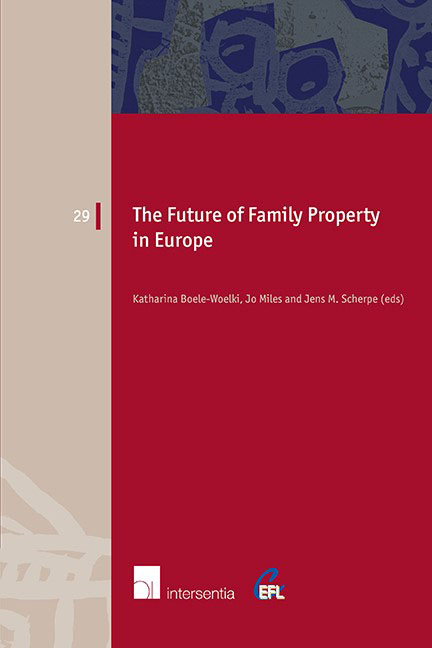Book contents
- Frontmatter
- Preface
- Contents
- List of authors
- PART ONE KEYNOTE LECTURE
- PART TWO MATRIMONIAL PROPERTY LAW IN EU ROPE
- PART THREE FAMILY CONTRACTS – ISSUES OF AUTONOMY
- PART FOUR PROTECTION OF OLDER PEOPLE IN LAW
- PART FIVE FREEDOM OF TESTATION AND PROTECTION OF FAMILY MEMBERS
- PART SIX CHILD MAINTENANCE
- PART SEVEN UNIFICATION OF PRIVATE INTERNATIONAL FAMILY LAW
- PART EIGHT CLOSING REMARKS
Financial Consequences of Divorce: England Versus The Rest of Europe
Published online by Cambridge University Press: 08 May 2020
- Frontmatter
- Preface
- Contents
- List of authors
- PART ONE KEYNOTE LECTURE
- PART TWO MATRIMONIAL PROPERTY LAW IN EU ROPE
- PART THREE FAMILY CONTRACTS – ISSUES OF AUTONOMY
- PART FOUR PROTECTION OF OLDER PEOPLE IN LAW
- PART FIVE FREEDOM OF TESTATION AND PROTECTION OF FAMILY MEMBERS
- PART SIX CHILD MAINTENANCE
- PART SEVEN UNIFICATION OF PRIVATE INTERNATIONAL FAMILY LAW
- PART EIGHT CLOSING REMARKS
Summary
INTRODUCTION
In the common law world England & Wales is the powerful jurisdiction. What we do in London is followed in a number of other jurisdictions, both legislatively and by precedent.
We apply only the lex fori in family proceedings, we do not apply the law of another jurisdiction. Under our law there are no property consequences of marriage. However, there are profound property consequences of divorce. In that event the parties submit all relevant assets to a process of redistribution in the discretion of the trial judge, conducted now under Part II of the Matrimonial Causes Act 1973. Parliament has put few bounds on the exercise of that judicial discretion. There is only a checklist specifying first child welfare and then all the circumstances having particular regard to assets, needs, age, duration of marriage, health, contribution and conduct. Rather more the exercise of the discretion is guided by precedent, that is to say previous reported decisions, particularly of the appellate courts.
HISTORY
It is worth sketching the background to see how statutory provisions not fundamentally reformed since their introduction in 1971 have been construed and to trace the steps by which we have walked from where we were then to where we are now.
The first powers to order capital payments had been introduced in 1963 but the judges had chosen to exercise them with great caution. At the outset the extensive powers introduced by the Matrimonial Proceedings Act 1970 were also hardly applied innovatively but as a component in a financial scheme at the heart of which lay periodical payment orders.
Economic growth, prosperity, the erosion of hallowed distinctions between capital and income, the decline of the aristocratic and landed classes, the emergence of huge fortunes very rapidly amassed: all contributed to a fresh approach. The clean break and the capitalisation of future liabilities in a single present payment became the norm when affluent people divorced. For this there was statutory foundation in the reforms introduced by the Matrimonial and Family Proceedings Act 1984. However, there remained a distaste in the senior judiciary, still exclusively male, for the megabucks publicised in Los Angeles settlements and a determination not to introduce standards that might encourage the gold-digger or spread cynical disregard for the marriage vows. This judicial attitude is well illustrated in the judgments in the appeal in Preston v Preston.
- Type
- Chapter
- Information
- The Future of Family Property in Europe , pp. 3 - 16Publisher: IntersentiaPrint publication year: 2011



